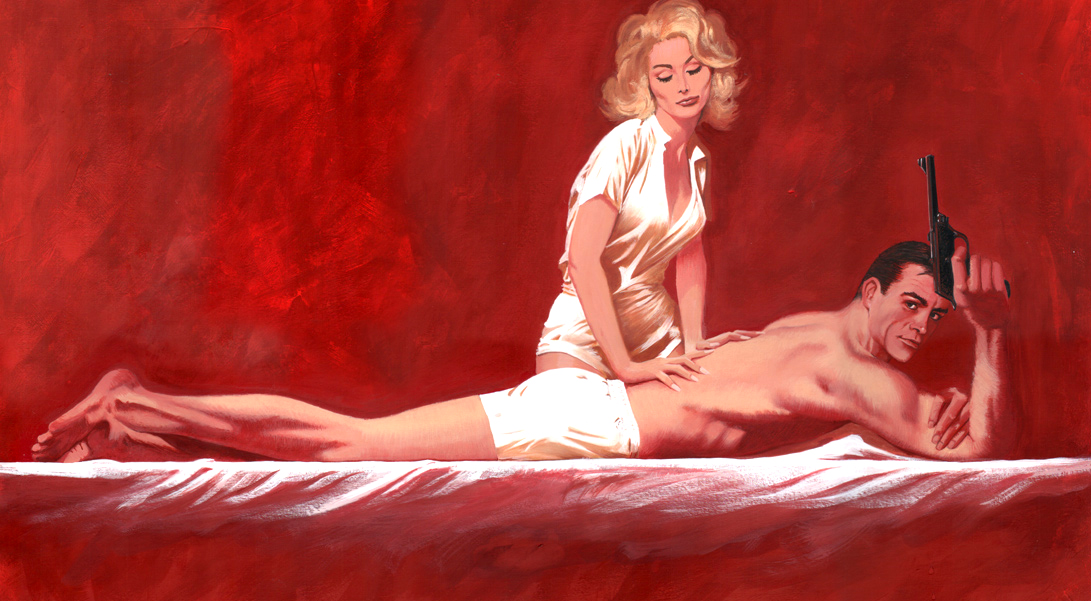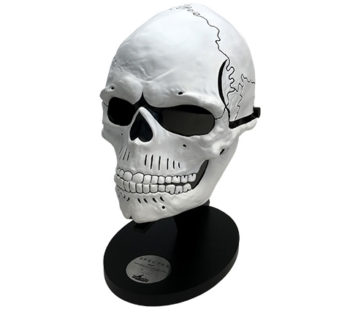An overview of Austria – but first, a bit about Bond 24, SPECTRE.
Bond 24, entitled SPECTRE, is due to be released on November 6th of this year. While details of the Skyfall follow-up remain under wraps, we know Bond will receive a cryptic message from his past that will lead him to uncover the "terrible truth" behind the shadowy organization, while M – played by Ralph Fiennes - battles political forces that want to shut down the British secret service.
Speaking of the plot, SPECTRE had a stumbling block out the gate, when the original scripts were stolen by a group calling themselves the Guardians of Peace, during the cyberattack on the computers of Sony Pictures Entertainment. The film’s producers enlisted additional writers to help make changes to the script - and most particularly to the ending - after the script was leaked to the public.
---
SPECTRE is, of course, the shadowy apolitical terrorist organization created by Bond author Ian Fleming. It first appeared in his 9th Bond novel, Thunderball, and is an acronym for SPecial Executive for Counterintelligence, Terrorism, Revenge and Extortion. It is the organization Dr Julius No worked for in the movie, which, in the book, was the USSR. Fleming believed that the Cold War might end during the time it would take to produce the film, which would leave it looking dated; he therefore thought it better to create a politically neutral enemy for Bond. Fleming's SPECTRE has elements inspired by mafia syndicates and organized crime rings that were actively hunted by law enforcement in the 1950s. The strict codes of loyalty and silence, and the hard retributions that followed violations, were hallmarks of U.S. gangster rings, Mafia, the Chinese Tongs/Triads and the Japanese Yakuza/Black Dragon Society.
SPECTRE is led by supervillain Ernst Stavro Blofeld, or “the man petting the white Persian cat” in the films. His identity was revealed in You Only Live Twice, then he appears in 3 more Bond films before it’s implied that he’s killed in the opening credits of For Your Eyes Only. He is perhaps the iconic Bond villain, variously portrayed by Donald Pleasance, Charles Gray, Telly Savalas and Max Von Sydow, as well as inspiring the character of Dr Evil in Mike Myers' Austin Powers films. In the books, his 2nd in command is Emilio Largo, who appeared in Thunderball – both the novel and the movie – as well as the movie Never Say Never Again (which I’ll talk about in a minute).
In Bond 24, Oscar-winning Austrian actor Christoph Waltz is to play a character called Oberhausen. This is the name of the climbing and skiing instructor from Fleming's books who taught Bond while he was at Fettes College. It is not yet clear, however, whether there is any connection between Waltz's screen role and Blofeld. Asked if he would be the head of the terrorism organization, Waltz said: ‘No. No. It's more interesting than that.’
---
The Bond producers only regained the rights to use the names Blofeld, Largo and SPECTRE a year ago, after settling a long-running legal case with the estate of Kevin McClory.
The dispute has been ongoing since 1959, when writer McClory suggested a Bond set in the Bahamas to Ian Fleming. The idea eventually formed the basis of the novel Thunderball, as well as its film adaptation. Fleming and McClory collaborated but later had a falling out, and the courts ruled that the Dublin-born McClory owned “significant elements of the 007 mythos.” As such, McClory was able to produce the "unofficial" 1983 Bond film Never Say Never Again, restoring Sean Connery to the Bond role one last time.
Though McClory, who died in 2006, was legally prohibited from making new Bond films, the settlement means rights to characters introduced in Thunderball are once more available to Danjaq, the producer of the rest of the Bond films. This is why the 2006 adaptation of Fleming's novel Casino Royale had to use a “SPECTRE-esque” organization called “Quantum,” which may have seemed odd to fans with a knowledge of SPECTRE, but not of the lawsuit!
The deal also paves the way for Never Say Never Again to be included in official collections alongside Octopussy, the "official," Roger Moore-headed, Bond film, which was also released in 1983. Now there’s a question – would it remain the step-child “Bond 13 1/2,” or would we suddenly skip from Bond 24 to…Bond 26, leaving out the ¼ century Bond 25 in the count? Or maybe even suddenly re-name this one Bond 25…? Hmmmmm…..
------
Austrian locations for Bond 24 - SPECTRE = include Obertilliach [OH-bear-tilliac], a ski area located near the Italian border, as well as Lake Altaussee [AHHH‘lt-aus’say], which also offers skiing, but could make for a great water chase…and has several miles of winding roads perfect for the new Aston Martin DB 10. The Austrian ski resort of Sölden [Zuu-den], where the first World Cup races of the season are often held, is also featured. In some of the initial photos released from the movie’s filming, one can see the gondola leading up to the modern ICE Q Restaurant in Sölden [Zuu-den], a new restaurant at the top of the mountain. It is slightly reminiscent of Piz Gloria [PITZ Glowria], the famous Swiss location in On Her Majesty's Secret Service.
----
As my husband is Austrian, this podcast, in Head of Section “style,” is designed to keep you from putting your foot in your mouth if you decide to visit this lovely country.
-------
While Austrians and Germans speak the same language - or nearly – they share a troubled history and have a hard time putting up with each other. Germans think of Austrians as one might a troublesome young nephew. Austrians think of Germans as a stuffy, stick-in-the mud wealthy autocratic uncle.
This Austro-German opposition reflects the dichotomy between the prototypical Austrian and the prototypical Prussian. The former is a Catholic traditionalist, courteous and amiable. But this can be viewed derisively, in German eyes, as being “dissembling and slimy,” as Waltz recently said in his interview on Conan O’brien, when asked the difference between Austrians and Germans. On the other hand, the prototypical Prussian-German, in Austrian eyes, is a stiff Protestant, arrogant and excessively formal, uptight, too direct, and lacking in humor, with a penchant for lecturing the whole world. Counterintuitively, the stuffy German is likely to get loud and sloppy at Oktoberfest, whereas the amiable Austrian is far more likely to enjoy a friendly but less “tankard-clinking” evening in a wine garden with friends.
Austrians are proud of their contributions to world civilization. They see themselves as modern, liberal and cultured. Austrians have a great love for the outdoors, such as walking, skiing, climbing, and hiking. The rate of women working outside the home is one of the highest in the industrialized world.
Whereas an outsider might lump Austrians in with Oktoberfest-tankard-clinking, beer-drinking Germans, in actuality, as I just mentioned, Austrians are far more likely to be drinking wine or coffee, both of which they take quite seriously. In fact, Vienna, the capital of Austria, gets its name from the Latin “Vin De Bona,” or “good wine.” There is archaeological evidence of wine cultivation in Austria going back 4,000 years.
And we’re not talking sweet German riesling wine, either. Austria’s main production is its crisp dry white wine, Gruner Veltleiner. This minerally wine has recently made its way to the states, and is featured in Heurigers – wine gardens – in Austria. If you see a pine branch hanging outside of a location in Austria, it means that they have wine waiting for you to try. Because of ancient tax laws, these wine gardens didn’t used to be able to offer food – they do now of course, but in a sort of picnic fashion – so often you will see people bringing their own food to the wine garden and purchasing their libations there. Quite the opposite of some spots in the States, which are “BYOB”!
One of my personal favorite Austrian wines is actually the effervescent Stürm – wine, usually Gruner, that is only a few days or weeks old. It is bubbly, refreshing, not too alcoholic... and it isn’t available for very long, or outside of the actual winery making the wine! I’m always sad when we visit Austria outside of Stürm season, and always wistfully ask!
The delicious, first-class Austrian red wines – such as Blaufrankisch and Zweigelt – are generally snapped up by the Austrians themselves and rarely make it outside the country’s borders.
My husband and I have spent many a wonderful day in Austria going from pine branch’d locale to pine branch’d locale –it would be difficult to stress how important wine – not beer! – is to Austrians!
In passing, the country is also home to Riedel, makers of some of the most expensive wine glasses in the world. In a bit, I will discuss a few of the protocols of drinking and eating in Austria – but first, back to the history of the Austrians and the Germans!
------
Back in the 18th century, Frederick the Great snatched almost the whole of Silesia from the Austrians. In 1866, at the Battle of Königgrätz, Wilhelm The First’s Prussian army crushed Emperor Franz Joseph’s imperial Austrian forces. But after World War I and the fall of the Austro-Hungarian Empire, the severely reduced Austrian state fared far worse than even her sister Germany – where we have seen the newsreels of people trying to purchase bread with a wheelbarrow of cash. So it’s no wonder that, scarcely 20 years later, there was little resistance to the Anschluss, their country’s annexation by the Third Reich.
When it comes to the Second World War, it’s important to understand that, while Salzburg has become a tourist mecca for fans of the movie The Sound of Music, most Austrians did not have it so lucky. The Von Trapps were an exceedingly wealthy family, and if you opposed the German Reich, you could not just “climb any mountain” to escape. My father-in-law was conscripted into the German Army, as was any regular Austrian. It was fight or be imprisoned – or worse. My mother-in-law’s first husband was “disappeared.” Asking an Austrian if they “love” the Sound of Music is always a bad idea – a mistake that I made when first dating my husband, because I actually do like that movie. They feel that it implies anyone could get away from the Anschluss. And as an aside – Eidelweiss is NOT an Austrian song, it was invented for the movie – so if you’re a fan don’t think that will bring you closer to an Austrian by “knowing” it!
----
The relationship of Austria to Germany could be compared to that of the Irish and the English. Austrians actually do have a Celtic heritage, which Germans do not. Austria is the location of the first characteristically Celtic culture to exist, and possesses one of the largest collections of Celtic artifacts in Europe. Celtic Austria became culturally Romanized under Roman rule, and only culturally Germanized after Germanic invasions.
Since my husband is Austrian, a week doesn’t pass when a friendly – he would likely say “overly friendly” – American tries to “guess where his accent is from.” The conversation normally goes something like this:
“I sense that you have an accent – where are you from?”
“Carifornia.”
“No, no” they say, – as if my husband is stupid – “I mean, where are you FROM? Is it Germany?”
Cold look – “No.”
I step in as the baffled American can’t quite figure out why they are being looked at as if they stepped in dog doo. I offer,
“My husband is Austrian.”
“Oh!” they enthuse, “I love the kangaroos!”
I know that you’re smiling, but this happens more often than you can imagine. In fact, they sell a Tshirt in the tourist shops in Vienna that shows milk cows up on their hind legs hopping through bucolic fields, with a caption that says, “No, it’s Aus-TREE-uh.”
-----
If you are faced with the situation of wanting to make conversation with someone like my husband, and you believe that the accent is “German-ish”, here is a tip: Always Guess Austrian. A German will be amused – an Austrian will be impressed. If you guess Germany, an Austrian will be insulted. I tend to do this also when I meet someone that I think might be from either Australia or New Zealand – I always guess New Zealand, and if the person is indeed a Kiwi, they are always flattered that I “didn’t call them an Australian.”
----
And now, some helpful hints if you find yourself in Austria. One thing you will find is that while Austrians speak German, it’s not the German that you learned in school, or that’s spoken in Germany! Their accent is not as hard, and their “ch” sound is softer. Although my husband would laugh at my pronunciation, the German word for I – Ich – is pronounced more like “Ish.” The language is very melodic to listen to. I had German for years in college, and I usually can’t make out what is being said! I guess the best way I can explain it is that “Austrian German” sounds a bit like Jamaican English.
One idiom that you definitely want to know is the traditional Austrian greeting of “Servus.” The greeting evolved from commoners greeting their lords with the words: servus humillimus, Domine spectabilis, meaning your humble servant, my noble Lord. No subservience is implied in its modern use – just like an agnostic might say “God Bless You” after you sneeze. And as an aside, “Gesundheit” means “Health,” and actually is not used in either Germany or Austria – in Germany, you’re more likely to hear "Geht's wieder?" (Better now?) and in Austria, "Zum Wohl" ("to your health")).
But back to “Servus.” This greeting takes the place of “Guten Tag” or “Guten Morgen” – the German form of Hello – AND Tshuss or Auf Weidersehen, the German form of Goodbye. “Servus” can even be a toast.
You will also hear the phrase "Grüß Gott" – or ‘God Greet You’ – often used by people you don’t know, such as a merchant. In Austria, like in France, it’s very important to greet any shop keeper when you enter their establishment, and also when you exit. (You can say “Servus” in both cases.) The reason merchants in France and Austria are sometimes viewed as “standoffish” is that you are expected to greet them, first. If you’re nervous to try out your accent, “Hallo” is also is used by modern Austrians as a greeting.
--------
Drinking and eating is very important in Austria. I am not going to even get into the protocol surrounding coffee – if you want that, you’ll need to ask me a question in the Forum! But let’s just cover a few things so that you won’t look hopelessly rude if you’re asked to a meal, or drinks, by an Austrian.
At business or social occasions, shake hands with everyone present--men, women and children—women before men, then children. If you’re a woman, you should offer your hand first, as an Austrian man will not reach out to you – it’s your responsibility to reach out to him. Shake hands again when leaving. If you are a woman and you extend your hand, and an older Viennese man kisses it, accept this tradition graciously. Men also enter restaurants before women – I always like to think this is to be sure “the coast is clear of ruffians” – so don’t expect a man to step back and allow you to pass, and if you’re a woman, try to step back so that this can happen seamlessly.
While a (usually) older Viennese man might kiss a woman’s hand, a foreign man should not kiss the hand of an Austrian woman, as it’s not expected and may come as a shock. Kissing, hugging, touching and physical closeness in public are not common, and this is definitely a reserved society where a greeting does not involve a kiss or two on the cheeks! If you are in Austria with your mate, it’s really best to leave public displays of affection for your hotel room, as they will make people around you feel embarrassed.
Austrians are suspicious of hyperbole, promises that sound too good to be true, or displays of emotion. In fact, in many situations, Austrians will be direct to the point of bluntness. This is not an attempt to be rude, it is simply indicative of their desire to move the discussion along. Austrians also may find personal compliments embarrassing, so if you’re going to compliment someone, be sure that you are sincere, but low key. If you enthuse – because you’re an American and we are an enthusiastic people – you may find the necklace, ring, hat or scarf that you went on about tucked away in your purse after you leave!
As a final note about body postures that you might not know are rude, don’t put hands in your pockets while speaking to anyone. It has a connotation that you’re “counting the change in your pockets” instead of listening.
-------
If you want to try your hand at the German language, always use the formal word ‘Sie’ for “you” unless invited to use the informal 'du'. People are generally addressed by their academic title and surname, and you may be referred to simply by your surname. This is not a culture that uses first names except with family and close friends. Titles are important, and when people are probing you what you do for a living, or about your education they are usually trying to figure out how to address you. If you are, for example, a woman who has a PhD, you might be introduced as Frau Doktor Mueller – from then on, you are likely to be referred to as Frau Doktor. Oh, and all women over 18 are Frau, even if they are not married. Just go with the flow – don’t make the American gaff of saying “oh, just call me Sandy” or thinking that referring to an older woman as “Fraulein” will imply that she “looks young.” It’s just considered insulting.
If you do not have an honorific title, you may just be referred to as Herr or Frau, with or without your surname. Again, this is the way things work in Austria – don’t try to impose the American “first name basis” on people unless you’ve gotten quite familiar with them. As an analogy, if you know the German language, when someone states that you can use “du” in referring to them instead of “Sie,” that is when you are likely to also be able to ask whether you can call them by their first name. I, however, after 20 years, still refer to my father in law by Herr and his last name, though we do use the informal “du” with one another. And he formally asked if he could use my first name when addressing me – well after my husband and I were married.
--------
Drinking has its own ceremonial protocol in Austria, in which eye-contact plays a central role.
When clinking glasses, Austrians take a moment to make eye contact and say "Prost" to each person in the round. It means “to your health.” The most important part of this is to have eye contact with the person you are toasting – NOT with your glass. Since toasting started when people didn’t trust one another and would “clink tankards” so that a bit of the liquid would slop from one into the other – proving that you were not poisoning the person you were drinking with – if you look at the glass, it’s considered a symbol of distrust . . . as if you are watching to ensure that none of their “poisoned liquid” made it into your glass!
-------
If you’re invited to dinner, don’t begin eating until the hostess or host says 'mahlzeit' or 'Guten Appetit'. The host gives the first toast – don’t forget to look the person you’re toasting with in the eye as you say Prost! If you are the honored guest, you offer a toast of thanks to the host at the end of the meal.
As Austria is Catholic, grace might be said over the meal, so it’s a good idea to just wait until the host or hostess has taken a bite before you eat or drink anything at your setting. But “Mahlzeit” or “Guten Appetit” will always come after the Grace (and before the host picks up their own fork) – so that’s your cue! If you are at an informal gathering and are perhaps served before others, if the hostess says “Mahlzeit” to you, it basically means “go ahead and eat.” It took me a while to realize that they really mean it – they want you to eat while your food is hot.
If you are eating a nice meal in Austria, and you'd like to compliment the chef, one way of doing that is cutting your food with the side of your fork as opposed to using your knife. This lets the chef or hostess know that whatever they cooked is so tender that you don't even need a knife. When it comes to the ubiquitous dumplings – never, ever cut a dumpling. Instead, hold it with your knife, and break it apart with your fork. And perhaps it goes without saying, but in this country, you eat with your fork in your left hand and cut with your knife in your right – no “switching off” fork and knife. Forks are used tines up, as opposed to the bulk of Britain where forks are used tines down, and food is piled up the back.
Totally stuffed? Be sure to eat everything served to you, then put your fork and knife side-by-side on your plate with the handles facing right to show that you’re done. An open knife and fork on your plate means you would like more food or that you are not yet finished eating – and if you’re at a restaurant or having a multicourse meal, everyone – including the waiter waiting to clear the table - will wait until all knives and forks are in this position! If you are having a meal with chopsticks, the opposite is true – crossed chopsticks means that you are finished, whereas aligned chopsticks mean that you’re “ready to continue using them” – in other words – are still hungry. And by the way - You’re an adult – unless you’re allergic, you need to eat everything that was served to you in a private home. It’s the height of rudeness not to.
In a restaurant, the person who extends the invitation pays the bill. Austrians will not appreciate a struggle over the bill. Reciprocate with a lunch or dinner invitation before you leave the country. Usually the tip left is whatever change there is from the bills you hand the waiter, though in some establishments this is changing to a 5% tip.
---
I hope that this rather long podcast gives you not only some updates on SPECTRE, but also some hints on how to act during your next trip to Austria. Remember – like in Paris – you will always be treated better if you dress like Bond, not like a blue-jeans-wearing, backpack-toting American. Toast with your eyes, greet shopkeepers coming and going, and go with the flow. I look forward to hearing about your trip! Servus!
- Sandy Shepard











Top 5 Rejected James Bond Theme Songs
The "No Time To Die" Review